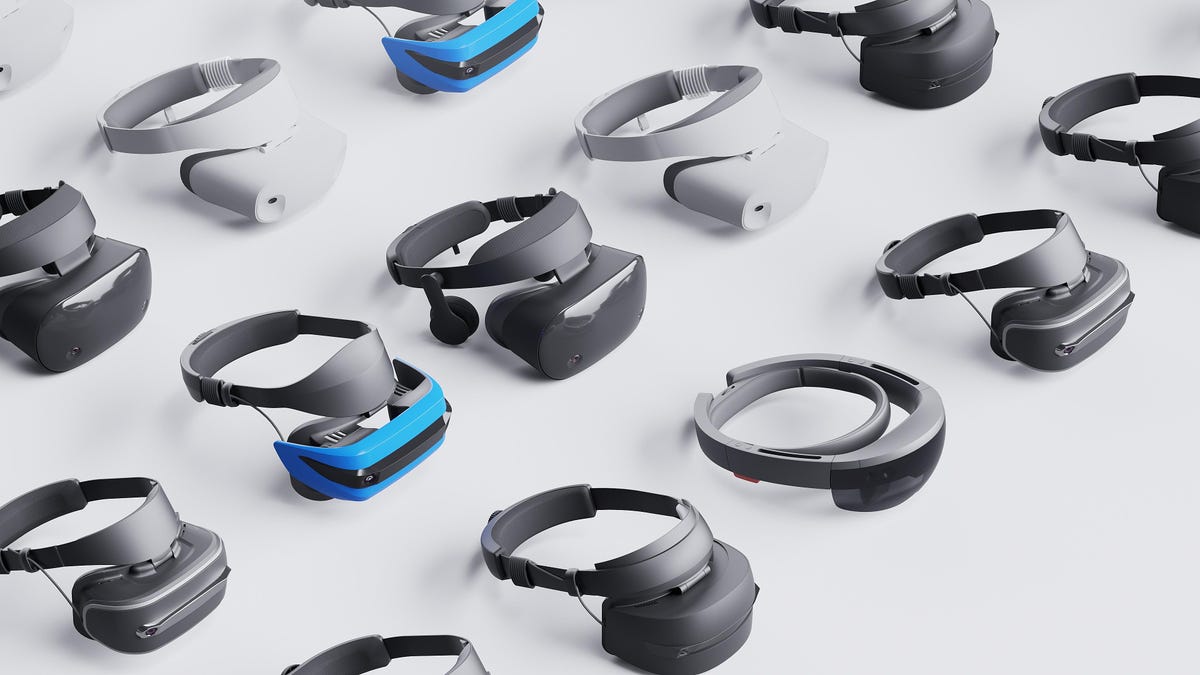Microsoft wants to reimagine VR
The world’s biggest software maker is hoping to succeed where Facebook, HTC and Sony haven’t yet.
You can't escape virtual reality.
VR headsets from Acer, Dell, HP, Lenovo and Samsung are getting ready to hit the market. Their goal: to give you an easy-to-use virtual reality experience with your PC at a lower price than competing headsets from the likes of Sony, Facebook and HTC.
That's the promise of VR powered by Microsoft Windows, the software that runs hundreds of millions of PCs and tablets around the world. When Microsoft begins sending out a free update to Windows 10 on Tuesday, it'll power VR headsets as well. It's called "Windows Mixed Reality."
This technology "will forever unleash the creativity of people and organizations around the planet," Alex Kipman, a Microsoft technical fellow working on Windows Mixed Reality, said during an event last month in San Francisco.
Windows, combined with these companies' devices, he added, is "a perfect pairing and an unrivaled experience."
What we're waiting to see, though, is whether that's enough to actually persuade people to buy in.
For the past five years, the tech industry has been in a frenzy over virtual reality , a technology decades in the making. At its essence, VR lets you strap a screen so close to your face that your brain is tricked into thinking you're actually in a computer-generated world. That means one moment you could be helping a cartoon fox through a wacky obstacle course, while the next you could be fighting seemingly endless waves of robots.
In that time, the VR industry has grown from a crowdfunding effort by a startup called Oculus VR to a multibillion-dollar bet by the likes of Samsung , Sony , Google , HTC and Facebook , which bought Oculus in 2014 for more than $2 billion.
Now add Microsoft and its horde of PC partners as well.
That's good news to Debby Ruth, a senior vice president covering media at consultancy Frank N. Magid Associates, who said deep-pocketed, patient companies like Microsoft will help the industry handle growing pains like the price of headsets, their bulky designs and the lack of compelling apps.
"This is not going to happen overnight," she said.
Appealing to your pocketbook
While some of the world's largest companies are pushing their way into VR, people haven't been rushing to get on board.
HTC has declined to share sales data, but Sony said it's tallied more than a million of its $399 PlayStation VR headsets sold since landing on store shelves last year. That's compared with the more than 60 million PlayStation 4 video game consoles that can power it.
Oculus has also declined to share sales data, but it's estimated to have sold more than a million units, people familiar with the company said.
For a technology that tech executives like Facebook CEO Mark Zuckerberg say will change the way we use computers at home and at work, many industry executives and analysts acknowledge that a few million VR headsets is a slow start.
It's hard to know exactly what's keeping people from jumping in, but price could be part of it. That's why Facebook dropped the price of its $599 flagship Rift headset, making permanent a six-week price cut to $399 that it had instituted over the summer. That was the third reduction in the year and a half since its launch.
Zuckerberg also last week unveiled a new $199 headset, called Oculus Go, that works without requiring the wires, sensors and powerful PC that runs the Rift.
"We want to bring people from 'it's crazy to own a VR device' to 'it's crazy not to,'" Nate Mitchell, an Oculus co-founder and the company's vice president of product, said in an interview after the announcement. "Demand is there at the right price and with the right content."
Facebook's chief competitors, Sony and HTC, have followed suit. The PlayStation VR dropped to $400 from $500, and the Vive dropped to $599 from $799, all in the past three months.
That brings us back to Microsoft, whose partners -- like Acer and Lenovo -- are selling their Windows-powered headsets for as little as $399. That doesn't include the roughly $500 starting price for a PC capable of running the VR experience. Microsoft's even updated its own laptop, the Surface Book 2, to be able to power VR headsets.
It's also shown apps that car companies like Ford can use to prototype its newest cars, for people to meet and chat in groups in virtual conference rooms and even to play standard video games from an Xbox console.
"It will give you an unparalleled experience," Kipman said while showing off the features.
We'll soon find out if everyone else agrees.
First published Oct. 17, 5:00 a.m. PT.
Update, 12:06 p.m.: Adds details about the Surface Book 2.
Virtual reality 101: CNET tells you everything you need to know about VR.
CNET en Español: Get all your tech news and reviews in Spanish.


